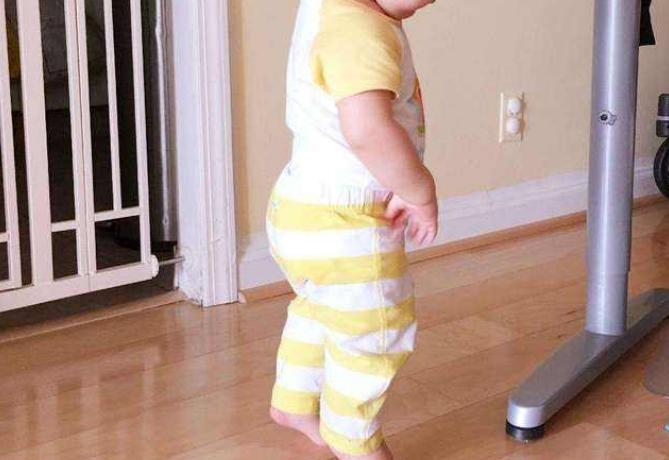Text/Song Mama said parenting (original article, welcome to reprint and share)
"The sooner a child toddler, the smarter they get."
I believe that many new parents have heard such words, in the eyes of the elders, "three years old to see the big" is not empty at all.
When babies learn to walk, the learning speed of babies with different personalities can also provide a certain reference for their future intellectual development.
In order to make their babies stand out, many parents unconsciously expect their children to learn to walk as soon as possible. For this motive, this part of the parents will take any of the baby's walks as a breakthrough, even if the posture is abnormal.
But when the baby grows bigger and bigger, parents find that the baby's learning to walk seems to have become a seedling to help grow...

The baby's walking "tiptoe" may be abnormal development, 2-3 years old should pay special attention, and the delay is difficult to make up
For parents, when babies start learning to walk, it means that their parenting mileage is a big step forward.
In order to make the baby grow better, parents who listen to the "parenting experience" of the older generation will unconsciously encourage their children to learn to walk as soon as possible, but this blind "encouragement" is actually a very wrong approach.
When the child is 2 years old, she, like many mothers around her, hopes that the child can learn to walk as soon as possible, so even if the child's walking posture is a little abnormal, she did not correct it in time.
But when the child was a little older, the tiptoe that had been tiptoeing up worried her. For the sake of insurance, she took the child to the hospital for examination, only to find that the child's leg muscles had a problem, and the long-term tension of the Achilles tendon was the direct cause of the "tiptoe".
Isn't it better for children to learn to walk as early as possible?
Under Xiao Li's doubtful gaze, the doctor said the original commission: it turns out that the baby walks "on tiptoes", and really needs to pay attention to the situation seriously!
Physiological "tiptoeing" – fading away with age
In the child's toddler stage, due to the inability to walk upright, the baby who has not learned to walk has poor mastery of the soles of the feet, and the tiptoes are actually their subconscious actions.
For physiologically tiptoe babies, their condition is mostly at 4-10 months, and the duration of tiptoeing is short, and when they stand steadily or crouch on the ground, they will switch to complete flat stepping.
Medically, this physiological "pad tiptoe" is called "excessive pointed foot", and most babies with this condition will change this habit around the age of 2 and return to a normal walking posture without too much care.
Pathological "tiptoeing" - fear of abnormal development, need special attention
If your baby's "tiptoeing behavior" persists around the age of 3, parents should consider pathological "tiptoeing."
Unlike physiological tiptoes, pathological tiptoeing, once they appear, means that the baby's body hides huge risks, and there are terrible hidden dangers such as cerebral palsy, autism, and muscle atrophy.
Most children will master walking skills at the age of 1-2 years old, learn to walk alone, if beyond this age of children still can not walk normally, even if parents correct is still using the wrong way of tiptoeing, parents should be vigilant.
For major diseases such as cerebral palsy and autism, the baby's onset is generally accompanied by other symptoms, in addition to the tiptoe, parents can find that the baby's foot development is abnormal, there is a backward motor development, or audiovisual function development and other visible conditions.
When the baby has one or more of the above symptoms, parents need to take the baby to the hospital for examination as soon as possible, delaying the condition and missing the best diagnosis and treatment time, which is likely to cause irreparable consequences.
Write at the end
Babies in the toddler stage, language expression ability has not yet fully developed, which requires parents to accompany the child at any time, timely from the abnormal performance to find hidden dangers, to maximize the protection of children's health.
When the child has abnormal performance, parents should not blindly believe in advertisements or acquaintances recommended by "famous doctors" without medical qualifications, and immediately decide that going to a professional hospital for treatment is the right solution.